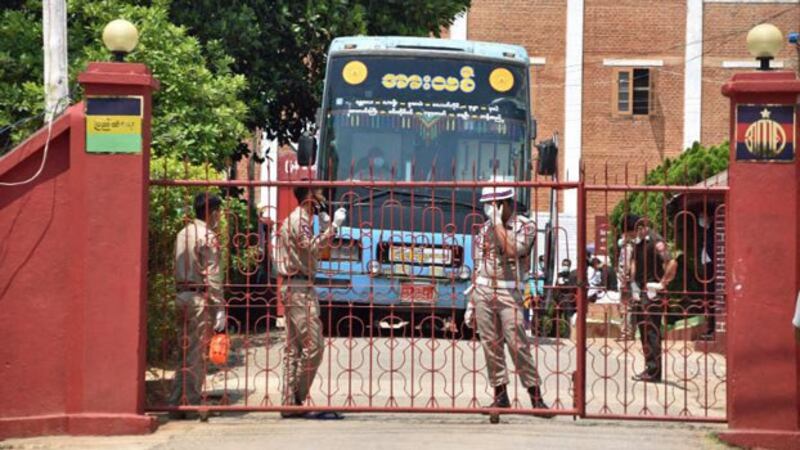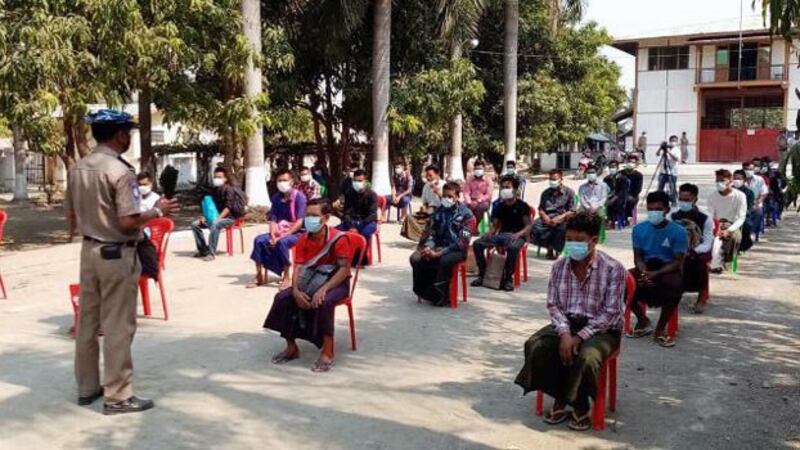Myanmar President Win Myint pardoned nearly 24,900 prisoners from across the country on humanitarian grounds on Friday, including as many as 20 political detainees, as part of an annual holiday amnesty marking Myanmar’s Buddhist New Year.
The president commuted death sentences to life-in-prison terms with no release, and reduced life sentences without a time limit to 40 years, sentences of more than 40 years to only 40 years, and sentences of less than 40 years to a quarter of the prisoners’ original terms.
The amnesty did not include two prominent Rakhine politicians — Aye Maung, a member of parliament and former chairman of the Arakan National Party (ANP), and writer Wai Hin Aung — both political prisoners convicted of high treason and defamation.
Aye Maung’s son, Tin Maung Win, who lives in Rakhine state’s capital Sittwe, said he is not hopeful that his father will be released because the rule of law does not prevail in Myanmar.
“Some friends called me to say that my father might be included in the amnesty,” he told RFA’s Myanmar Service. “For us, we are not hopeful anymore.”
“This country is full of lawlessness, so we have nothing to hope for. I think the situation is getting worse under the NLD government,” he said, referring to the ruling, civilian-led National League for Democracy administration that has run the country since 2016.
Aung Maung and Wai Hin Aung were arrested in January 2018 after giving speeches at a public event in Rathedaung township in Myanmar’s volatile Rakhine state.
They were sentenced by the Sittwe District Court in March 2019 to 20 years in prison each for high treason and to two years for incitement with the sentences to be served concurrently.
Bo Kyi, cofounder and secretary of the Assistance Association for Political Prisoners (Burma) (AAPP), a nonprofit human rights organization that advocates for the unconditional release of all political prisoners, said his group was compiling a list of those who have been freed.
The AAPP confirmed the release of 10 political prisoners on Friday and believes that 21 in all could be released.
“We are contacting their families as much as we can,” Bo Kyi said. “Once they are reunited with their families, we can confirm their release.”
Political prisoners in jail or undergoing trial include those who allegedly criticized government officials or the powerful Myanmar military, and peaceful protestors such as ethnic minorities who demonstrated against armed conflict in Myanmar.
There are 76 political prisoners in jails across the country, with 140 more facing trials while in detention, and 400 others undergoing trials outside prison.
Myanmar presidents customarily commemorate the Buddhist New Year festival known as Thingyan by releasing thousands of prisoners.
“The amnesty may be continued for another day,” Bo Kyi said. “The government will have several challenges as it is working with many organizations. We have appealed to it to release all prisoners of conscience.”

Naga rebels released
Aung Htut, chairman of the Naga ethnic group’s Culture and Literature Committee, told RFA that 11 ethnic Naga prisoners, including the leader of the rebel Naga National Socialist Council, were freed on Friday.
“All eleven prisoners have been released,” he said. “Two in Mandalay, one in Monywa, two in Shwebo, and six in Kanti. We are helping transport them to their homes by chartered buses since all the [public] bus services are closed.”
Aung Htut said that the Naga Culture and Literature Committee had sent a written appeal to the president to release the 11 political prisoners.
Nearly 3,000 prisoners, meanwhile, were released from Yangon’s notorious Insein Prison, while more than 1,551 were freed from Obo Prison in Mandalay, Myanmar’s second-largest city by population.
Myo Htay, deputy director of Obo Prison, told RFA that there are no more political prisoners in his correctional facility.
“We don’t have any political prisoners,” he said. “A quarter of our prisoners were granted amnesty today, and it was given fairly to them. We have coordinated with the Myanmar Police Force to arrange chartered buses to transport them.”
More than 400 prisoners, including Chinese nationals, were freed from jails in Lashio, the largest town in northern Shan state.Over 1,000 inmates, including 10 Chinese, were released from Myitkyina, capital of neighboring Kachin state. Both states border China.
More than 473 inmates were released from Kinthar Nos. 1 and 2 Manufacturing Detention Camps in Tatkone township of the capital Naypyidaw, while 53 others were let go from Naypyidaw Prison.
“We are releasing all prisoners convicted for drug-related charges,” said Htay Lwin Tun, assistant director of Kinthar No. 1 Manufacturing Detention Camp.“Some have been convicted of other charges as well. In those cases, they were granted amnesty for sentences on drug charges, while their remaining sentences were reduced by a quarter.”
“If the remaining sentences meet the requirements for today’s amnesty, then those prisoners will be released,” he added.

Checkups, COVID-19 briefings
Prisoners who were granted presidential pardons received medical checkups and were briefed on coronavirus prevention before they were released to curb the spread of the deadly pandemic, the Ministry of Home Affairs said.
Htay Lwin Tun said that newly released inmates were given certificates to show they were free of the virus so that they will be accepted back into their home communities.
Than Zaw, a prisoner who was released from Naypyidaw Prison, told RFA that there were frequent programs inside the detention facility to educate inmates about the coronavirus, or COVID-19.
“It has been three or four weeks since the first COVID-19 cases were detected,” he said. “Since then, we’ve had many workshops about the disease.”
“All the prison officers are taking it very seriously,” he added. “They also have instructed the prisoners to maintain social distancing and to wash their hands frequently after they return home from prison.”
Earlier in April, rights groups in Myanmar called for the release of low-risk offenders as the country’s number of confirmed COVID-19 cases inched upwards, sparking fears of outbreaks in overcrowded detention centers.
The AAPP and Human Rights Watch also called on Myanmar authorities in early April to release prisoners from the country’s unsanitary, jam-packed jails to limit the spread of the virus.
As of Friday, Myanmar registered a total of 88 confirmed COVID-19 cases, though the number of deaths remained four. The country confirmed its first coronavirus-related death on March 31.
During Thingyan in April 2019, Win Myint pardoned 9,551 prisoners — most of them serving time for narcotics offenses — including 16 foreigners and only two political prisoners.
About a week later, he ordered the release of nearly 7,000 inmates from seven prisons during a second presidential amnesty, including two political prisoners from Kachin state.
In early May, the president announced a third amnesty, releasing about 6,500 more detainees, including 20 political prisoners, among whom were two Reuters reporters serving seven-year jail terms for violating Myanmar’s state secrets law.
Reported by RFA’s Myanmar Service. Translated by Ye Kaung Myint Maung. Written in English by Roseanne Gerin.
